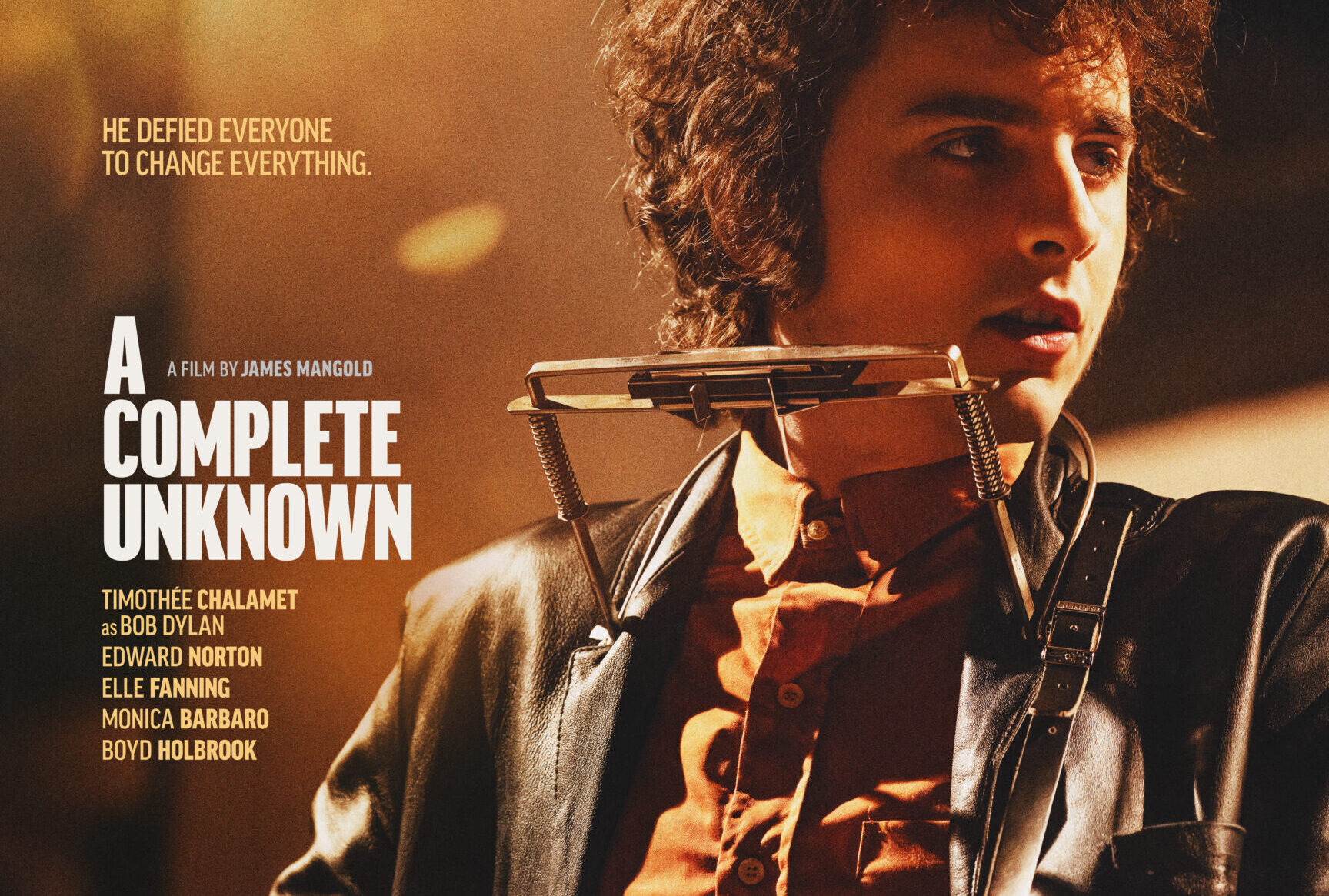“A Complete Unknown” is a lovesick ode to folk music.
Co-written and directed by James Mangold and based on Elijah Wald’s biography “Dylan Goes Electric!,” “A Complete Unknown” chronicles the early rise of folk rock sensation Bob Dylan.
Mangold (“Ford v Ferrari,” “Logan”) revitalizes the musical biopic formula he set the standard for. Having directed country legend Johnny Cash’s ascent in 2005’s “Walk the Line,” Mangold finds new territory to tell a similar rockabilly origin with “A Complete Unknown.”
Set between 1961 and 1965, the film is split in two halves, detailing Dylan’s rapid upstart and transition from folk to electric rock.
Playing Dylan, Timothée Chalamet earnestly absorbs the spirit of the legendary singer-songwriter. Chalamet (“Dune: Part Two,” “Call Me by Your Name”) tunes his voice to Dylan’s cadence and authentically performs each song with guitar and harmonica. Chalamet mirrors Dylan’s enigmatic presence, rarely smiling yet radiating boyish sarcasm.
Act one follows Dylan’s burgeoning career as a Greenwich Village bar singer climbing ranks to become the new face of American folk. Chalamet thrives in depicting the singer as an untethered youth, solemn yet sarcastic and quick to strum a song.
Act two skips ahead to Dylan’s monumental fame and the intense backlash he received after going electric. Chalamet evolves his performance to show Dylan’s hermit nature as fame closes in and he pushes against the status quo of folk music.
“A Complete Unknown” is an enriching clipshow of Dylan’s early relationships and music. Inspiring his simplistically soulful songs are duelling love interests — painter Sylvie Russo (Elle Fanning) and folk icon Joan Baez (Monica Barbaro).
Adding to the alternative-artist ensemble are folk trailblazer Woody Guthrie (Scoot McNairy), singer and social activist Pete Seeger (Edward Norton) and country rocker Johnny Cash (Boyd Halbrook).
Mangold carefully directs Dylan’s music and the personnel who influence it. Each performance is intimately staged to solely focus on lyrics and instrumentation. Close-ups on Dylan and company humming a tune or groaning a melody result in each song feeling like a private talk between old friends.
Dylan classics such as “Blowin’ In The Wind,” “The Times They Are A-Changin’” and “Like a Rolling Stone” are respectfully recreated by Chalamet and Mangold. However, while the film is expertly crafted in direction and performances, its plot leaves much to be desired.
A victim of its split-focused narrative, neither half feels wholly complete in resolution. Dylan floats from circumstance to stage with increasingly little conflict, as the film showcases the broad events of his life without dissecting his emotional depth outside of enigmatic narcissism.
Dylan’s partner Sylvie is given the worst of the brunt — his apparent muse is forgotten by the movie as often as by Dylan himself. Dylan rarely reflects or gives reason for his selfishness, as the film’s omission of his substance abuse inadvertently implies his egotism as something innate rather than a cruel effect of the spotlight.
The broader portrait of the American ‘60s zeitgeist, and Dylan’s impact on it, is offensively surface-level and self-aggrandizing. The film halts its pace to reference events such as MLK’s march and JFK’s assassination only to immediately transition to Dylan’s lyrics on the matter miraculously uniting all audiences.
The film’s central conflict in the back half of electric versus acoustic goes largely unexplored. The setup of what folk music represents with or without electricity is as skin-deep as most of the film’s core discussions. Similarly, the film ignores the hypocrisy of a progressive audience not accepting sonic innovation.
The ensuing vitriol Dylan then faces for switching from acoustic can’t help but feel like an over-the-top caricature — historically accurate or not.
“A Complete Unknown” is a well-crafted tribute to fans of folk music and Bob Dylan’s body of work. Yet when scraping away the grounded performances and clean direction, the film lacks anything to say about Dylan or the ‘60s music moment.
If audiences enter knowing little about Dylan as a person, they’re likely to leave still not knowing much about him. The film relies on Baez, Seeger and coincidentally Cash to fill the void of attraction left vacant by a lead who’s mysterious without complexity.
Despite Chalamet’s dirty nails strumming the guitar, “A Complete Unknown” is an overpolished whistle.
“A Complete Unknown,” rated R, comes to theaters Christmas Day.


